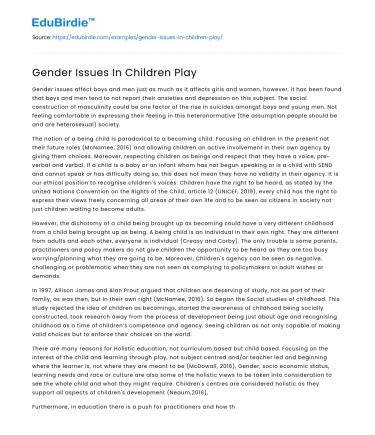Gender issues affect boys and men just as much as it affects girls and women, however, it has been found that boys and men tend to not report their anxieties and depression on this subject. The social construction of masculinity could be one factor of the rise in suicides amongst boys and young men. Not feeling comfortable in expressing their feeling in this heteronormative (the assumption people should be and are heterosexual) society.
The notion of a being child is paradoxical to a becoming child. Focusing on children in the present not their future roles (McNamee, 2016) and allowing children an active involvement in their own agency by giving them choices. Moreover, respecting children as beings and respect that they have a voice, pre-verbal and verbal. If a child is a baby or an infant whom has not begun speaking or is a child with SEND and cannot speak or has difficulty doing so, this does not mean they have no validity in their agency. It is our ethical position to recognise children’s voices. Children have the right to be heard, as stated by the United Nations Convention on the Rights of the Child, article 12 (UNICEF, 2019), every child has the right to express their views freely concerning all areas of their own life and to be seen as citizens in society not just children waiting to become adults.
Save your time!
We can take care of your essay
- Proper editing and formatting
- Free revision, title page, and bibliography
- Flexible prices and money-back guarantee
However, the dichotomy of a child being brought up as becoming could have a very different childhood from a child being brought up as being. A being child is an individual in their own right. They are different from adults and each other, everyone is individual (Creasy and Corby). The only trouble is some parents, practitioners and policy makers do not give children the opportunity to be heard as they are too busy worrying/planning what they are going to be. Moreover, Children's agency can be seen as negative, challenging or problematic when they are not seen as complying to policymakers or adult wishes or demands.
In 1997, Allison James and Alan Prout argued that children are deserving of study, not as part of their family, as was then, but in their own right (McNamee, 2016). So began the Social studies of childhood. This study rejected the idea of children as becomings, started the awareness of childhood being socially constructed, took research away from the process of development being just about age and recognising childhood as a time of children’s competence and agency. Seeing children as not only capable of making valid choices but to enforce their choices on the world.
There are many reasons for Holistic education, not curriculum based but child based. Focusing on the interest of the child and learning through play, not subject centred and/or teacher led and beginning where the learner is, not where they are meant to be (McDowall, 2016), Gender, socio economic status, learning needs and race or culture are also some of the holistic views to be taken into consideration to see the whole child and what they might require. Children's centres are considered holistic as they support all aspects of children's development (Neaum,2016).
Furthermore, in education there is a push for practitioners and how they are gendering children. As gender and sexuality are socially constructed (Kane, 2013) teachers and practitioners should offer ranges of experience instead of identifying their behaviour along specific male or female lines. There is an need for teachers and practitioners to be educated so they are aware of issues which may arise, such as intersex children (children whom have characteristics of both male and female sexes), or Gender Identity Disorder of Childhood, GIDC, (children experiencing continual discomfort with their assigned sex). This could help provide support to a child who may be feeling constrained and/or confused, giving them agency over their own gender (Kane, 2013)
In the contemporary family, children do not hold much power but that is not to say they passively comply to their parents rules and regulations, they negotiate with them (McNamee, 2016). Children can be hyper-responsible, censoring themselves and knowing what they should be doing. By being social actors, children participate in their own life.
Some organisations see the importance of children being. They understand how giving children the option for their own safety and to have their own point of view, especially as a child, is valid. For example, the NSPCC have a campaign named ‘Pants’. This campaign aims to teach children how to keep themselves safe from abuse by informing parents how vital it to have the conversation with their children about sexual abuse and teaching parents how to make sure the conversation is appropriate and easy for a child to understand.






 Stuck on your essay?
Stuck on your essay?

